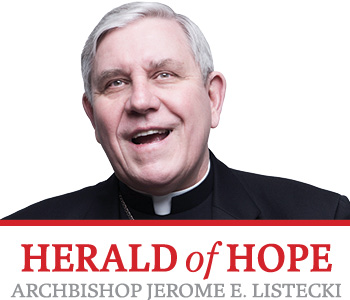Herald of Hope
Growing up, we look to role models that challenge and inspire us. As a boy who loved sports, in baseball, I wanted to hit like Ted Williams of the Boston Red Sox and field like the agile Willie Mays of the San Francisco Giants, but Minnie Minoso of the Chicago White Sox was my “idol” without peer. My request for a gift at my First Holy Communion was an autographed baseball from Minnie Minoso. In basketball, I wanted to dominate like Wilt Chamberlain, though in stature I was a good foot and some inches shorter, and to play defense like the crafty and graceful Bill Russell. In football, I wished to run like the graceful Gale Sayers and to be as defensively ferocious as Dick Butkus. I am a kid whose roots are planted in the Southeast side of Chicago, much to the chagrin of my friends here in Milwaukee. You can take the kid out of Chicago Bear country, but you cannot take the Chicago Bear out of the kid.
We look to those who have achieved a certain level of excellence and model their behavior even if it is just in our fantasy. We wear their team colors and proudly display their numbers. Even to this very day, as gray hairs emerge, we cherish the basketball, football or baseball cards displaying the stats that reflect the achievements of these sports stars.
When we hold in high esteem these sport figures for their accomplishments, it is an additional bonus when their personal lives are virtuous. Their sports achievements are what Aristotle refers to as “intellectual virtues.” It is a perfection of the craft. However, their personal virtue is a reflection of their very character.
We have all encountered talented actors whose ability on stage is tremendous but whose life off the screen is awful and even scandalous. I would like to perform like them but never be like them in their personal life. Success on the stage or a playing field may gain fame, but it will not gain a heavenly reward unless it is accompanied by a good life. St Francis of Assisi never hit .300, nor scored 30 points, nor ran back a kickoff, but his holiness has him standing before God, something we all ultimately wish to achieve.
Men, in the modern age in which we live, need male role models. In a certain sense, they need the examples and support of fellow men. I could make a good case that one of the ills of our society is the lack of the male figure in our families. I am sure that many are familiar with the book, “It Takes a Village.” However, I hold that it takes a “family” with strong role models. It is only in the absence of those familiar figures that surrogates are needed to fill the empty gaps. The father figure is a key component to the healthy development of a young boy growing up. My father was there for the family. He taught me respect and appreciation for my mother. He taught me the importance of performing my responsibilities when I made a commitment. He taught me love for our country, and in his struggle with cancer, he taught me how to die surrounded by the family he loved. He accompanied the family to church on Sunday and was never ashamed to kneel in prayers.
It should come as no surprise that we refer to God as our Father. Jesus himself tells us when you pray, pray to Our Father, “Abba.” The Catechism of the Catholic Church tells us (240) Jesus revealed that God is Father in an unheard of sense: he is Father to his only Son, who is eternally Son only in relation to his Father: “No one knows the Son except the Father, and no one knows the Father except the Son and any one to whom the Son chooses to reveal him.”
Developing a male spirituality takes the support of believing and dedicated men who can share their faith and witness their commitment to others. The Church is privileged to have groups that provide Catholic men with the opportunity to grow in their faith. Some of our parishes will establish men’s groups such as the Holy Name Society. Others will initiate weekly scripture studies.
There are also national organizations. Fr. Michael McGivney organized the Knights of Columbus to support the Catholic immigrant community and challenge the prejudice that attacked those who professed their Catholic faith. This fraternal organization extended support for widows and orphans. It emphasized the practice of the faith and established foundational principles of Charity, Unity, Fraternity and Patriotism. A good Catholic man who lives his faith is also a good citizen and contributes personal services to address the needs of the society.
Another group which was developed here in the Archdiocese of Milwaukee is Men of Christ. This organization is quickly gaining national attention. It began with a recognition that Catholic men needed to be supported in their faith, to understand the richness of the teachings of the Church and to integrate those teachings into one’s life. The group emphasizes the importance of their witness to their family, their community and other men. They encourage Dynamic Men’s Groups on a local parish level. This enables the men to share in a program which enriches their understanding of the faith and assists in building relationships with men of the parish, creating a type of spiritual brotherhood.
I encourage all men to consider becoming an active member of a Catholic Men’s group. I am a Fourth-Degree Knight of Columbus, and I also enthusiastically support the Men of Christ. We need to hold Christ and his Church before us, proud that we are men called by Christ to serve the needs of our families and our parish communities. In this way, we can never forget that the road to holiness comes through our Love for Christ and his Church.

